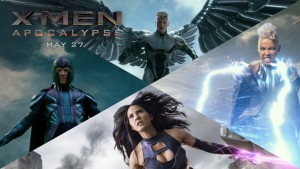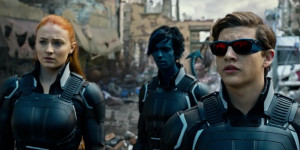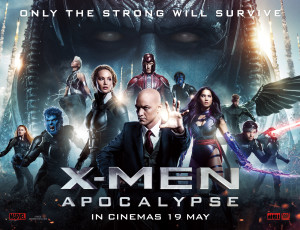X-Men: Apocalypse
Reviewed by Gavin Burrows 17-Jun-16
“The third film is always the worst.” Does X-Men: Apocalypse buck that trend?
“We can all agree that the third film is always the worst.”
That line tells us two things. First, as the characters are leaving a screening of Return of the Jedi, this new film in the X-Men series has moved the action forward to the 1980s. But also, most have spotted a sly reference to X-Men: The Last Stand (2006). The last film in the original trilogy, the only one Bryan Singer didn’t direct, was met with a somewhat underwhelming fan response. Yet of course the gag is going to prove either audacious or a hostage to fortune, this being the third film in the new series. And this time with Singer directing. The ante is even upped by giving the line to Jean Grey, a character specified with the ability to see disaster ahead.
Setting each film in a successive decade brought with it a whole string of pluses. It gave each film its own identity by aligning it to the cinema of the era it was set in (First Class as 1960s spy caper, Days of Future Past as Vietnam vet film). Also, by giving each film an era of comics to encompass, it stops it trying to cram in everything. And it’s resetting of the clock gets over the fact that superhero films all have to be about origins. Here, for example, we have a bunch of young mutants embarking on their first mission as X-Men without it seeming a total rehash of First Class. Well, not a total one anyway.
Which raises the question, why set this one in the 1980s? Beyond the reference to Jedi, to malls and Pac Man, beyond the villainous Mohican haircuts, what’s there? The answer the film seems most keen on is the Cold War. Okay, ostensibly First Class covered that. But then the Cold War of the 1980s was a different beast, at least in terms of its iconography, which is all that matters here.
Xavier’s school, though way too close to Hogwarts for mutants, is relaxed and comfortable rather than battle-ready – only Jean’s bad dreams warn of the shadow to fall. Which does seem close to the way the Cold War was perceived at the time, with its images of mushroom clouds over garden suburbs. The Stryker subplot, otherwise narratively redundant, reinforces this with its black helicopter secret ops paranoia. But it’s perhaps brought out in the open when En Sabah Nur (aka Apocalypse) awakens and hijacks the world’s warheads, resulting in lots of repeated cut-to’s of War Rooms.
 When not busy with that, he sets about recruiting four new Horsemen of the Apocalypse from among the mutants. He essentially seduces them into this role through his ability to augment (or, in Angel’s case, revive) their mutant powers. Notably, he first appears to Storm as she’s being menaced by a bunch of bigger guys. His cult is something like a gang. The attraction of joining is that it makes you feel more powerful. (And isn’t a cult just a gang with an ideology?) It’s tempting to try to link this to the rival camps of the Cold War; as a song of the day put it, the two tribes. Significantly he’s defeated by everyone uniting against him, including a couple of his former acolytes. Xavier tells him “You’ll never win. Because you are alone.”
When not busy with that, he sets about recruiting four new Horsemen of the Apocalypse from among the mutants. He essentially seduces them into this role through his ability to augment (or, in Angel’s case, revive) their mutant powers. Notably, he first appears to Storm as she’s being menaced by a bunch of bigger guys. His cult is something like a gang. The attraction of joining is that it makes you feel more powerful. (And isn’t a cult just a gang with an ideology?) It’s tempting to try to link this to the rival camps of the Cold War; as a song of the day put it, the two tribes. Significantly he’s defeated by everyone uniting against him, including a couple of his former acolytes. Xavier tells him “You’ll never win. Because you are alone.”
But then how does the link fit together? He’s openly contemptuous of the two tribes, essentially commenting “puny super powers”, seeing them as sandcastles to kick over.
As Bryan Singer himself explained it: “the big giant ego of the god is that the world lacks order and respect/devotion to him. It needs to be culled, it needs to be wiped away and rebuilt.”
Which suggests he’s some kind of ultimate Social Darwinist, striking everything down so – as in the film’s tag line – “only the strong will survive”. “Everything that is built will fall,” he rages. Yet this seems remarkably unlike the way we saw him rule Ancient Egypt in the opening scenes, where he was more of a standard tyrant – less keen on destroying all humans than keeping them around to do his bidding. The speech where he compares the warheads to the spears, swords and slings of Ancient Egypt seems particularly nonsensical. If you want to rule, aren’t warheads a more attractive prospect than swords and slings? As he takes umbrage at the missiles the War Room bigwigs would have been forgiven for saying “we thought you’d like them”.
Perhaps he’s Thanatos, our sublimated death drive. (Okay, it’s Thanos that’s Thanatos. But that’s in the Marvel Cinematic Universe.) Death just woke up. And that’s why he’s so keen on reducing everything, humans included, to dust. When he first appears to Magneto, it’s just when the latter is about to bump off a bunch of pesky humans, a task Apocalypse obligingly takes up for him. This idea is reinforced by Apocalypse’s claim that he’s existed throughout history. After all, in the 1980s the threat of nuclear war was sometimes seem as a species-wide death drive.
Truth to tell, it’s hard to know what he wants. He talks of smashing everything down in one breath, then restoring his rightful rule on Earth in another. The scene where he’s first reanimated sums it up. In the grand tradition of Mummy movies, his tomb is being worshipped by followers. Who they are, how they know he’s there or how they relate to the people of his time (many of whom sacrificed their lives precisely to stick him there) isn’t explained.
And he isn’t even awoken by their prayers but when an investigating Moira inadvertently allows sunlight to fall on his tomb. At which point they leg it. What wakes him and how it happens is as arbitrary and generic as anything else about him. He’s destructive when he’s destructive and tyrannical when he’s tyrannical. He’s just the bad guy, okay?
But perhaps a worse crime than his lack of motivation is his lack of personality. People are compelled to follow him because that’s what will drive the film, rather than it feeling at all convincing. Perhaps we’ve been spoilt by the better-developed villains of the Marvel Comics Universe. But unlike Loki or Ultron it’s hard to think afterwards of one memorable line he utters. He’s somewhat like the pyramid he came out of, a monolith, a power object. He’s there so other things can move around him.
 X-Men films have such a population explosion that characterisation inevitably needs to be drawn in the broadest of strokes. But sometimes the strokes just cross. Scott is a Serious Young Man Burdened By His Powers who at one point suddenly announces they should skip school to hang out at the Mall. (There’s a suggestion this is when he gets his eye-protecting ray-bans, but the transition’s way too abrupt.) Dialogue can be clunky and scenes clichéd even for a superhero film. (Do we really need another scene where the superpowers manifest just when the school bully’s about to beat the kid up?) Characters’ powers ramp up and down as required by the plot. Apocalypse seems to have the ability to turn a mass of people to dust on sight, but sportingly doesn’t use this much when battling the heroes. And if Quicksilver can outrun explosions wouldn’t it be quicker for him to run places than fly? (It’s weird the way in Future Past he has one set-piece scene then retreats to his Mom’s basements. But maybe cameo appearances best suit him.)
X-Men films have such a population explosion that characterisation inevitably needs to be drawn in the broadest of strokes. But sometimes the strokes just cross. Scott is a Serious Young Man Burdened By His Powers who at one point suddenly announces they should skip school to hang out at the Mall. (There’s a suggestion this is when he gets his eye-protecting ray-bans, but the transition’s way too abrupt.) Dialogue can be clunky and scenes clichéd even for a superhero film. (Do we really need another scene where the superpowers manifest just when the school bully’s about to beat the kid up?) Characters’ powers ramp up and down as required by the plot. Apocalypse seems to have the ability to turn a mass of people to dust on sight, but sportingly doesn’t use this much when battling the heroes. And if Quicksilver can outrun explosions wouldn’t it be quicker for him to run places than fly? (It’s weird the way in Future Past he has one set-piece scene then retreats to his Mom’s basements. But maybe cameo appearances best suit him.)
Perhaps it’s easier to defeat an evil mutant with god-like powers than break the law of third helpings. While we might fannishly like to imagine them running as perpetually as the comics, perhaps a superhero film series has its lifespan. And that might be true even if they got over their obsession with origin stories. Their event-based nature traps them in ever-escalating hyperbole. “The Earth in twice as much peril as before! Three times the grimdark close-ups of pained expressions! Two-and-a-quarter times the CGI budget!”
If writing a monthly serialised comic is like running a marathon, these linked movies are like that scene they often contain, where the guy’s clinging to the ever-more-speeding vehicile while a British-accented villain bashes at his fingers. You can only keep hanging on for so long.
On the other hand… There remains something appealing in the way that, in the ceaseless war between the assimilationist and homo superior mutants, people will constantly change sides – and not always predictably. And the film is a genuine team effort, with no obvious protagonist. Mystique is probably closest, as much against her own wishes she becomes default leader. And as her loyalties move across the three films she functions as some sort of barometer. But in the final fight she probably contributes the least.
The third film in this trilogy… well it is the least. But it does withstand its own joke in performing better than Last Stand. It becomes clear that a fourth film in the trilogy is planned. In fact, as Jean leads the defeat of En Sabah Nur and he mutters darkly about what’s been “revealed”, for anyone who’s read the comics the finale itself becomes pretty much a lead-in for the next installment. And that doesn’t entirely leave you with a sinking feeling. Perhaps we could manage a 1990s involving Quicksilver getting into dance music and Storm tree-sitting in dreadlocks.
Tags: 20th Century Fox, Bryan Singer, Dan Harris, Marvel, Michael Dougherty, Simon Kinberg, X-Men, X-Men: Apocalypse